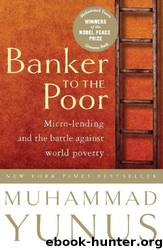Banker to the Poor by Yunus Muhammad

Author:Yunus, Muhammad [Yunus, Muhammad]
Format: epub
Publisher: Public Affairs
Published: 2015-05-21T16:00:00+00:00
From the very beginning, Grameen has gone against traditional methods of poverty alleviation by handing out cash without any attempt to first provide skills training. We have received a great deal of criticism for this policy, even from some of our friends. In Jobra, we simply did not see any need for formal training, and our experience in the 1980s gave us more confidence that we had taken the right approach.
Why give credit first?
I firmly believe that all human beings have an innate skill. I call it the survival skill. The fact that the poor are alive is clear proof of their ability. They do not need us to teach them how to survive; they already know how to do this. So rather than waste our time teaching them new skills, we try to make maximum use of their existing skills. Giving the poor access to credit allows them to immediately put into practice the skills they already know—to weave, husk rice paddy, raise cows, peddle a rickshaw. And the cash they earn is then a tool, a key that unlocks a host of other abilities and allows them to explore their own potential. Often borrowers teach each other new techniques that allow them to better use their survival skills. They teach far better than we ever could.
Government decision-makers, many NGOs, and international consultants usually start the work of poverty alleviation by launching very elaborate training programs. They do this because they begin with the assumption that people are poor because they lack skills. Training also perpetuates their own interests—by creating more jobs for themselves without the responsibility of having to produce any concrete results. Thanks to the flow of aid and welfare budgets, a huge industry has evolved worldwide for the sole purpose of providing such training. Experts on poverty alleviation insist that training is absolutely vital for the poor to move up the economic ladder. But if you go out into the real world, you cannot miss seeing that the poor are poor not because they are untrained or illiterate but because they cannot retain the returns of their labor. They have no control over capital, and it is the ability to control capital that gives people the power to rise out of poverty. Profit is unashamedly biased toward capital. In their powerless state, the poor work for the benefit of someone who controls the productive assets. Why can they not control any capital? Because they do not inherit any capital or credit and nobody gives them access to it because they are not considered credit-worthy.
I believe that many training programs are counterproductive. If Grameen had required borrowers to attend a training program in business management before taking out a loan to start a business, most of them would have been scared away. Formal learning is a threatening experience for our borrowers. It can even destroy their natural capacity or make them feel small, stupid, and useless. Also, poor people are often offered incentives to participate in training
Download
This site does not store any files on its server. We only index and link to content provided by other sites. Please contact the content providers to delete copyright contents if any and email us, we'll remove relevant links or contents immediately.
The Art of Coaching Workbook by Elena Aguilar(51201)
Trainspotting by Irvine Welsh(21668)
Twilight of the Idols With the Antichrist and Ecce Homo by Friedrich Nietzsche(18635)
Fangirl by Rainbow Rowell(9254)
Periodization Training for Sports by Tudor Bompa(8274)
Change Your Questions, Change Your Life by Marilee Adams(7783)
This Is How You Lose Her by Junot Diaz(6889)
Asking the Right Questions: A Guide to Critical Thinking by M. Neil Browne & Stuart M. Keeley(5775)
Grit by Angela Duckworth(5615)
Red Sparrow by Jason Matthews(5476)
Paper Towns by Green John(5191)
Room 212 by Kate Stewart(5124)
Ken Follett - World without end by Ken Follett(4734)
Housekeeping by Marilynne Robinson(4449)
The Sports Rules Book by Human Kinetics(4388)
Papillon (English) by Henri Charrière(4274)
Double Down (Diary of a Wimpy Kid Book 11) by Jeff Kinney(4273)
The Motorcycle Diaries by Ernesto Che Guevara(4102)
Exercise Technique Manual for Resistance Training by National Strength & Conditioning Association(4071)
